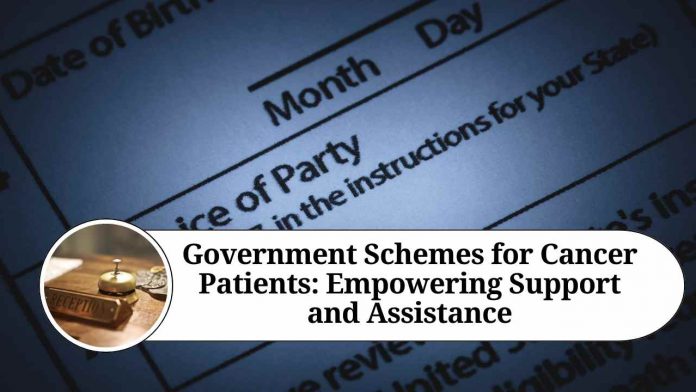Introduction:
Cancer is a formidable adversary that affects millions of lives worldwide. In the face of this life-altering illness, governments around the world have recognized the pressing need to support cancer patients in their battle against this disease. These government schemes aim to provide financial assistance, access to quality healthcare, and emotional support to alleviate the burdens faced by cancer patients and their families. In this blog, we will delve into some notable government schemes designed to empower and uplift cancer patients.
- Financial Assistance: Many governments have implemented schemes to provide financial aid to cancer patients, recognizing the exorbitant costs associated with diagnosis, treatment, and recovery. These schemes typically offer reimbursement for medical expenses, including hospital bills, chemotherapy, radiation therapy, and surgical procedures. Additionally, they may cover expenses related to medication, transportation, and accommodation during treatment. Such financial support helps alleviate the economic strain on patients and their families, enabling them to focus on their recovery without worrying about the financial implications.
- Health Insurance: Government health insurance schemes play a crucial role in ensuring cancer patients have access to quality healthcare services. These schemes often provide comprehensive coverage for cancer-related treatments, diagnostic tests, consultations, and follow-up care. By extending health insurance coverage, governments aim to make cancer treatments more affordable and accessible, enabling patients to receive timely and appropriate medical interventions.
- Cancer Screening Programs: Prevention and early detection are vital in the fight against cancer. Governments have launched various cancer screening programs to identify potential cases at an early stage, when treatment outcomes are generally more favorable. These programs often provide free or subsidized screenings for common cancers such as breast, cervical, colorectal, and prostate cancer. By detecting cancer in its early stages, these programs help initiate prompt treatment, improving survival rates and overall patient well-being.
- Palliative Care Support: Cancer patients often require specialized palliative care to manage pain, alleviate symptoms, and enhance their quality of life. Recognizing this need, governments have implemented schemes to ensure access to palliative care services. These programs focus on providing physical, emotional, and psychological support to patients and their families, aiming to enhance comfort and overall well-being during the treatment journey.
- Research and Development Funding: Governments play a vital role in advancing cancer research and development. They allocate significant funds to support scientific research, clinical trials, and innovative therapies aimed at combating cancer. By investing in research, governments strive to accelerate breakthroughs in cancer treatment, develop more effective therapies, and ultimately improve patient outcomes.
- Awareness and Education Campaigns: Governments actively engage in awareness and education campaigns to empower individuals with knowledge about cancer prevention, early detection, and available resources. These campaigns aim to dispel myths, promote healthy lifestyle choices, and encourage regular screenings. By raising awareness, governments work towards reducing cancer incidence and facilitating early intervention, leading to better treatment outcomes.
Conclusion:
Government schemes for cancer patients serve as beacons of hope in the arduous battle against cancer. These initiatives, encompassing financial assistance, health insurance coverage, screening programs, palliative care support, research funding, and awareness campaigns, collectively strive to alleviate the burdens faced by cancer patients and their families. By providing vital resources and support, governments play a pivotal role in empowering individuals affected by cancer, promoting a holistic approach to healthcare, and fostering a society that stands united against this devastating disease.
Read more useful content:
Frequently Asked Questions (FAQs)
Q.What types of financial assistance can cancer patients receive from government schemes?
Government schemes for cancer patients often provide financial assistance to cover medical expenses, including hospital bills, chemotherapy, radiation therapy, surgical procedures, medication costs, and transportation and accommodation expenses during treatment.
Q.Are cancer treatments covered by government health insurance schemes?
Yes, many government health insurance schemes include coverage for cancer treatments. These schemes aim to make cancer treatments more affordable and accessible, ensuring that patients have access to quality healthcare services, including diagnostic tests, consultations, and follow-up care.
Q.Do government schemes offer free or subsidized cancer screenings?
Yes, government schemes often include cancer screening programs that provide free or subsidized screenings for common cancers such as breast, cervical, colorectal, and prostate cancer. These programs are designed to detect cancer at an early stage for timely intervention.
Q.What support do government schemes offer for palliative care?
Government schemes recognize the importance of palliative care for cancer patients. They may include provisions for specialized palliative care services that focus on managing pain, alleviating symptoms, and enhancing the overall quality of life for patients and their families.
Q.How does the government contribute to cancer research and development?
Governments allocate funds to support cancer research and development initiatives. This funding goes towards scientific research, clinical trials, and the development of innovative therapies aimed at improving cancer treatment outcomes.
Q.Are there government schemes that provide emotional and psychological support for cancer patients?
Yes, many government schemes recognize the importance of emotional and psychological support for cancer patients. They may include provisions for counseling services, support groups, and mental health resources to help patients and their families cope with the emotional challenges of cancer.
Q.Can cancer patients receive financial assistance for alternative or complementary treatments?
Government schemes vary in their coverage for alternative or complementary treatments. It is advisable to review the specific guidelines of the scheme or consult with healthcare professionals to determine the available options and potential financial assistance.
Q.How can individuals access government schemes for cancer patients?
Information about government schemes for cancer patients is typically available through government healthcare agencies or official websites. Patients can inquire about the eligibility criteria, application procedures, and required documentation to access these schemes.
Q.Are there age restrictions for eligibility to avail government schemes for cancer patients?
Eligibility criteria for government schemes for cancer patients vary across different regions. While some schemes may have specific age restrictions, many aim to assist individuals of all ages diagnosed with cancer. It is recommended to check the specific eligibility criteria for each scheme.
Q.How can cancer patients benefit from government awareness campaigns?
Government awareness campaigns educate the public about cancer prevention, early detection, and available resources. Cancer patients can benefit from these campaigns by gaining knowledge about preventive measures, understanding the importance of regular screenings, and accessing support services and resources available in their communities.




















